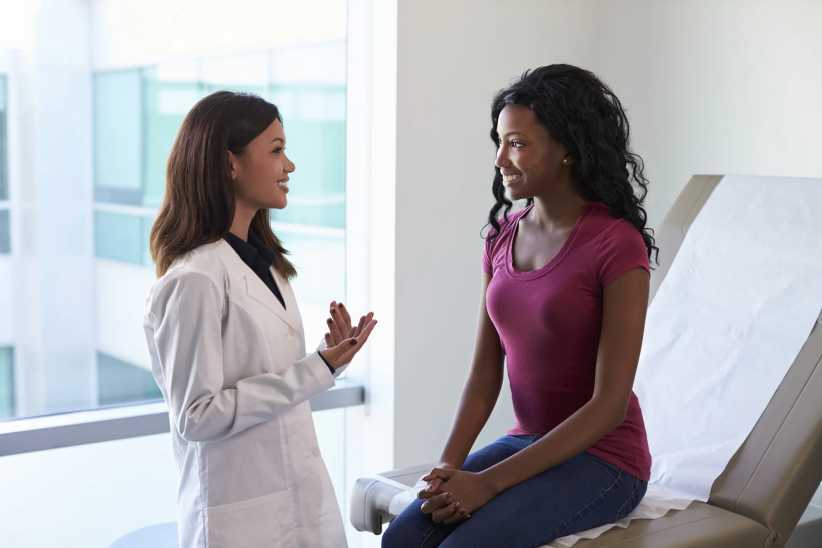
Moms, Are You Getting the Right Health Screenings? Find Out What You Need at Every Age
The One Appointment Every Mom Needs to Book NOW
Most of us know that annual physicals and age-appropriate screenings are key to staying healthy. But, let’s be honest … between school drop-offs, work meetings, and trying to squeeze in some version of self-care, it’s easy for parents to put their own health at the bottom of the to-do list.
Still, those yearly checkups matter more than we think.
Even if you feel great, routine physicals and screenings like blood pressure checks, mammograms, and Pap smears are crucial for catching potential problems early, before they turn into something more serious. Plus, they’re the perfect opportunity to chat with your doctor about any little changes you’ve noticed.
Psst… Check Out NYC Faces Rising Challenges in Postpartum Care
To help us understand why these check-up appointments are so important (and how to make the most of them), we spoke with Dr. Meleen Chuang, Medical Director of Women’s Health at the Family Health Centers at NYU Langone. Dr. Chuang shares what to expect at different ages, why prevention is powerful, and how parents can model healthy habits for the whole family.
Why are annual physicals so important, especially for busy moms?
Busy moms often put their family’s needs before their own. Annual checkups are often overlooked because you may feel perfectly fine. However, annual checkups are important for early detection and prevention of health issues.
Annual physicals are important because they allow for early detection of health conditions with no symptoms, such as certain cancers or illnesses. Preventative care gives you the opportunity to keep your health in top shape, such as getting updated vaccines, monitoring and treating chronic conditions, and improving your lifestyle (eating, exercise, mental health).
Building a good relationship with your health care provider is also a part of your annual physical. The more your doctor knows about you, the easier it is for your doctor to give you personalized and comprehensive health advice.
What are the most important screenings and checkups women should be getting at different life stages?
While specific recommendations can vary based on individual health history and risk factors, there are general guidelines. Regular basic checkups typically include monitoring your blood pressure to detect hypertension, checking cholesterol levels to assess heart disease risk, and screening for diabetes to keep blood sugar levels in check.
Staying up-to-date on recommended vaccinations is key to maintaining immunity, while mental health screenings can help identify and address issues like anxiety, depression, and stress. Lifestyle counseling is also valuable for discussions on smoking cessation, weight management, and nutrition. Finally, don’t forget about dental health—seeing a dentist once or twice a year for an exam and cleaning can help catch potential problems early.
Well Woman Exams:
Starting at Age 21
From age 21 and beyond, it’s important to keep up with your annual well-woman exam. This typically includes a review of your medical history, checks on vital signs, a physical exam, and assessments like a breast exam, skin exam, and eye and hearing tests. Your doctor will also monitor for signs of pre-diabetes, pre-hypertension, and track your weight and thyroid function. They’ll discuss your eating habits, lifestyle choices (like smoking, alcohol, and drug use), and the importance of staying active.
In addition, these tests should be performed:
- Pap Smear: Done during a pelvic exam to detect early signs of cervical cancer
- Infectious/STI Screening: Recommended if sexually active or with new partners
– Chlamydia and Gonorrhea: For women 25 and older, screening is recommended if at high risk.
– Hepatitis C: One-time screening for all adults aged 18 to 79.
— HIV: One-time screening for all adults aged 15 to 65. - Cervical Cancer Screening: Starts at age 21
– Pap test every 3 years for women ages 21-29
– Pap test every 3 years, HPV test every 5 years, or both every 5 years (“co-testing”) for women ages 30-65
– Continue Pap tests for 20 years after treatment for cervical dysplasia or until age 65, whichever is longer
Midlife and Beyond: Additional Health Considerations
In addition to the exams and screenings mentioned earlier, women in midlife and beyond should pay attention to the following health check-ups:
- Cancer Prevention Screenings
– Mammogram: Regular breast cancer screenings (typically every 1–2 years for women 40 and older).
– Colorectal Cancer Screening: Starting at age 45, or earlier if you have a family history or other risk factors.
– Lung Cancer Screening: For those at high risk, usually smokers or former smokers.
- Menopause Management
Annual exams are crucial for managing symptoms related to menopause (hot flashes, mood changes, etc.), as well as for addressing associated health risks (like osteoporosis and heart disease). This is also the time to discuss options such as hormone replacement therapy (HRT).
- Cholesterol Screening
Begins around age 45 for women with no known risk factors for coronary heart disease. More frequent screening may be needed depending on health status.
- Dental Exam:
Visit the dentist once or twice a year for an exam and cleaning to maintain oral health.
- Prediabetes and Type 2 Diabetes Screening:
Begin screening at age 35. If you are overweight or have obesity, screenings should be repeated every three years.
- Eye Exam:
Have an eye exam every 5 to 10 years before age 40. After 40, you may need them more frequently depending on your eye health.
How can moms make the most of their annual checkup?
Gather relevant information: Be ready to discuss any changes in your medical history, including new diagnoses, recent vaccinations, or surgeries.
Bring a list of medications: Include all prescription medications, over-the-counter drugs, supplements, and vitamins you are currently taking.
Share family medical history: Inform your doctor about any new health issues diagnosed in your close family members, as this can indicate a genetic predisposition.
Discuss lifestyle habits: Be honest about your exercise, smoking, and drinking habits, as these are important for your doctor.
Bring any health data: If you track your blood pressure, keep a food log, or use a symptom tracker, bring this information to share with your doctor.
Schedule related appointments in advance: If you know you need bloodwork or other screenings (like a mammogram), try to have them done before your physical and bring the results with you for review.
Be honest: Your doctor is there to help, not to judge. Be open and honest about your health and lifestyle.
Advocate for yourself: Don’t hesitate to ask for clarification, discuss options, or seek referrals to specialists if needed.
A lot of people skip checkups because they feel fine. What would you say to those folks about why prevention and catching things early matter?
Many people skip checkups because they feel healthy, but this can be a risky approach. Prevention and early detection are important because catching and treating diseases early significantly improve health outcomes and can lead to less invasive treatment options. Regular checkups allow for the early identification and management of chronic conditions like hypertension and diabetes, preventing them from getting worse.
Annual exams are a proactive step towards maintaining long-term health. Rather than waiting for an illness to force you to seek care, regular visits create a record of your health over time.
If you could give moms one simple but powerful piece of advice to take care of their health, what would it be?
Taking care of your own health isn’t selfish – it’s essential for you to continue being there for your family. If you don’t look after yourself, you won’t be able to look after others.
Dr. Meleen Chuang is the Medical Director of Women’s Health at the Family Health Centers at NYU Langone, where she provides compassionate care to women of all ages. With a deep passion for women’s health, Dr. Chuang specializes in managing conditions like polycystic ovary syndrome and abnormal cervical dysplasia, offering proactive and patient-centered care that ensures her patients are well-informed and actively engaged in their health decisions.
Psst… Check Out 6 Health Checkups Men Need at Every Stage of Life














